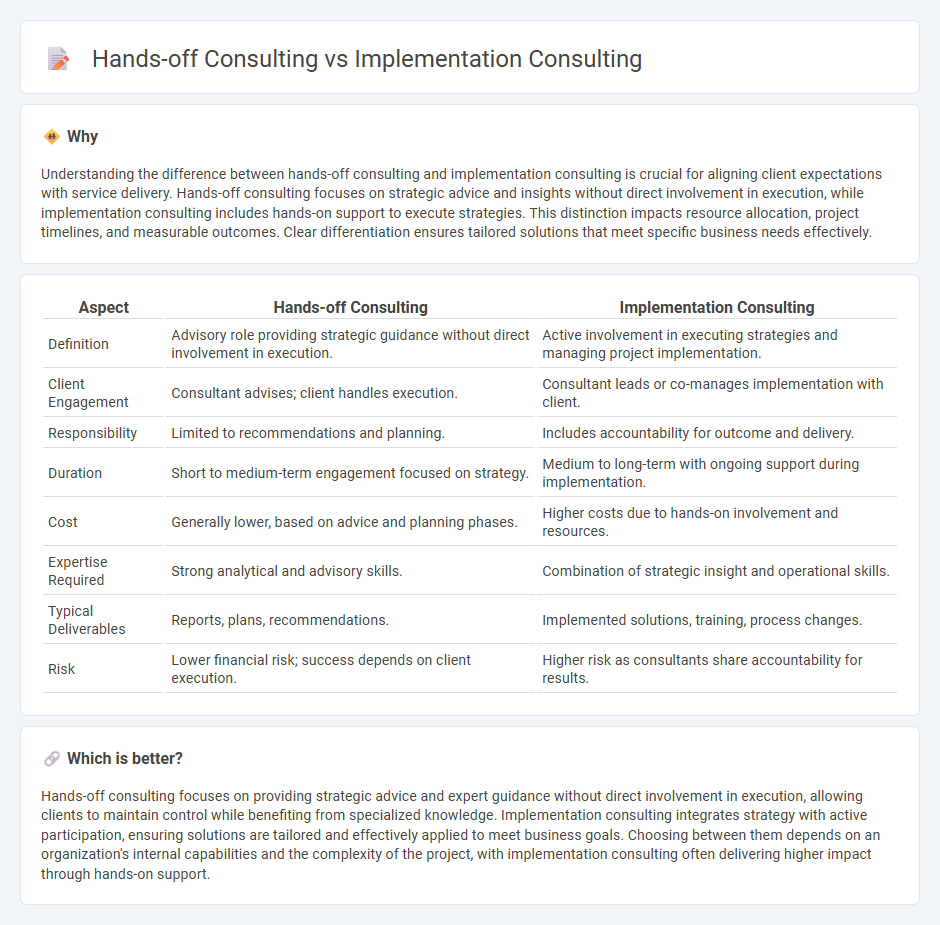
Hands-off consulting focuses on providing strategic advice and expert recommendations without direct involvement in executing projects, enabling organizations to maintain autonomy while benefiting from specialized insights. Implementation consulting, in contrast, entails active participation in deploying solutions and managing change, ensuring strategies are effectively translated into operational results. Discover how these consulting approaches align with your business needs to drive optimal outcomes.
Why it is important
Understanding the difference between hands-off consulting and implementation consulting is crucial for aligning client expectations with service delivery. Hands-off consulting focuses on strategic advice and insights without direct involvement in execution, while implementation consulting includes hands-on support to execute strategies. This distinction impacts resource allocation, project timelines, and measurable outcomes. Clear differentiation ensures tailored solutions that meet specific business needs effectively.
Comparison Table
| Aspect | Hands-off Consulting | Implementation Consulting |
|---|---|---|
| Definition | Advisory role providing strategic guidance without direct involvement in execution. | Active involvement in executing strategies and managing project implementation. |
| Client Engagement | Consultant advises; client handles execution. | Consultant leads or co-manages implementation with client. |
| Responsibility | Limited to recommendations and planning. | Includes accountability for outcome and delivery. |
| Duration | Short to medium-term engagement focused on strategy. | Medium to long-term with ongoing support during implementation. |
| Cost | Generally lower, based on advice and planning phases. | Higher costs due to hands-on involvement and resources. |
| Expertise Required | Strong analytical and advisory skills. | Combination of strategic insight and operational skills. |
| Typical Deliverables | Reports, plans, recommendations. | Implemented solutions, training, process changes. |
| Risk | Lower financial risk; success depends on client execution. | Higher risk as consultants share accountability for results. |
Which is better?
Hands-off consulting focuses on providing strategic advice and expert guidance without direct involvement in execution, allowing clients to maintain control while benefiting from specialized knowledge. Implementation consulting integrates strategy with active participation, ensuring solutions are tailored and effectively applied to meet business goals. Choosing between them depends on an organization's internal capabilities and the complexity of the project, with implementation consulting often delivering higher impact through hands-on support.
Connection
Hands-off consulting focuses on providing strategic guidance and expert recommendations without direct involvement in execution, while implementation consulting actively supports the application of those strategies to achieve desired outcomes. Both approaches are interconnected as hands-off consulting establishes the roadmap, enabling implementation consulting to translate plans into actionable steps and measurable results. Together, they ensure a seamless transition from advice to execution, maximizing organizational effectiveness and project success.
Key Terms
Change Management
Implementation consulting involves active participation in change management, guiding organizations through strategy execution, employee training, and process adjustments to ensure successful adoption. Hands-off consulting typically offers advisory services, providing frameworks and recommendations while leaving the client responsible for execution and internal change management. Explore comprehensive insights on change management approaches within consulting styles to determine the best fit for organizational transformation needs.
Knowledge Transfer
Implementation consulting emphasizes active collaboration with clients to ensure practical application of strategies, fostering a deep understanding and skill development within their teams. Hands-off consulting prioritizes delivering expert recommendations while allowing clients to independently integrate knowledge, often focusing on strategic guidance rather than direct involvement. Explore more about how Knowledge Transfer methods vary to maximize organizational impact.
Stakeholder Engagement
Implementation consulting emphasizes active stakeholder engagement by involving key participants directly in change initiatives to ensure alignment and commitment. Hands-off consulting prioritizes advisory roles, providing strategic insights while stakeholders independently manage execution and communication. Explore further to understand how choosing the right consulting approach can impact stakeholder collaboration and project success.
Source and External Links
Systems Implementation Consultant: What Do They Do & How Do ... - Implementation consulting involves guiding businesses through technology adoption by assessing readiness, customizing solutions, managing deployment, and providing ongoing support to ensure successful system integration and business process automation.
Implementation Consultant: What They Do & Salary Data | - Implementation consultants specialize in project management to execute pre-decided strategies, work as generalists or specialists, often in IT or CRM systems like Salesforce, ensuring solutions fit real-world business needs across the project lifecycle.
Implementation Consultant: What Is It? and How to Become One? - An implementation consultant is a third-party expert managing large-scale projects, developing strategies, and coordinating teams to implement significant organizational changes or software rollouts, requiring strong leadership, organizational, and interpersonal skills.
 dowidth.com
dowidth.com